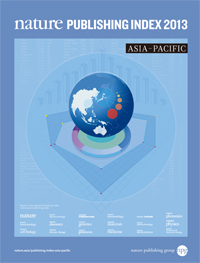people
The Nature Publishing Index 2013 Asia-Pacific has been released today. The index is a supplement to Nature, which measures the output of research articles from nations and institutes published in the 18 Nature-branded primary research journals over the calendar year.
A press release from the Nature Publishing Group follows below:
South Korea regains scientific impetus
PRESS RELEASE FROM NATURE PUBLISHING GROUP
Embargoed until 03.00 KST on Thursday 27 March 2014
South Korea ranks fourth for scientific research output in the region, according to the Nature Publishing Index 2013 Asia-Pacific released today.
In 2013, the nation significantly increased its NPI output following a slight drop in 2012.
Named a possible ‘one to watch’ by the supplement editors, with high levels of investment in science and technology announced by both government and private enterprise, its NPI output is growing faster than China’s.
The Korea Advanced Institute of Science and Technology has risen two places to take top spot above Seoul National University, which has retained second place. Pohang University of Science and Technology has leapt from eighth to third, with a more-than-threefold increase in corrected count, adjusted for the proportional contribution of collaborative institutions.
Last year’s number one, Yonsei University, could not maintain its exceptional 2012 NPI output and has dropped to seventh spot.
It is now just above a newcomer, the Institute for Basic Science (IBS), funded as part of the government’s increased investment in basic science. IBS plans to open 50 research centres by 2017 and will no doubt provide increasing contributions in the next few years.
To see the latest results for the region, and the Nature Publishing Index Global Top 100, visit the Index website at www.natureasia.com/en/publishing-index. The data posted on the website is updated every week with a moving window of 12 months of data.

-
people Top 10 Emerging Technologies by World Economic Forum
The World Economic Forum’s Meta-Council on Emerging Technologies announced its annual list of breakthrough technologies, the “Top 10 Emerging Technologies of 2016,” on June 23, 2016. The Meta-Council chose the top ten technologies based on the technologies’ potential to improve lives, transform industries, and safeguard the planet. The research field of systems metabolic engineering, founded by Distinguished Professor Sang Yup Lee of the Chemical and Biomolecular Engineer
2016-06-27 -
people Two Undergraduate KAIST Students Publish a Book on Health Management
Joonho Suh of the Aerospace Engineering Department and Jiho Suh of the Mechanical Engineering Department are both brothers and undergraduates at KAIST. The Suh brothers, who are three years apart, have recently published a self-help book in English on staying healthy entitled “A Scientific Approach to Building Muscle: Mass Effect.” The book introduces techniques to build muscles, adapting them from an engineering concept called "Active Torque Control (ACT)," the management o
2015-10-26 -
people Seven Graduates of KAIST S+ Convergence AMP Publish a Book, “The First Penguinâ€
Seven graduates of KAIST’s S+ Convergence Advanced Management Program (KAMP) have published a book containing their business success stories, The First Penguin, hoping that in telling their story, they will inspire readers who want to become entrepreneurs. The book is available only in Korean. The title of the book refers to a penguin that enters the water first when other penguins hesitate to dive into the ocean, symbolizing the need to make the first move. The book reflects the experien
2015-05-26 -
people Professor Shim Featured with His Drone System in IEEE Spectrum
The IEEE Spectrum, a technology and science magazine published by the Institute of Electrical and Electronics Engineers (IEEE), featured an article of KAIST’s autonomous unmanned aerial vehicles (UAVs) entitled “South Korea Prepares for Drone vs. Drone Combat,” posted on April 1, 2015. The article introduces the anti-drone defense system being developed by Professor “David” Hyunchul Shim of the Department of Aerospace Engineering at KAIST. With the goal of developi
2015-04-02 -
people Interactions Features KAIST's Human-Computer Interaction Lab
Interactions, a bi-monthly magazine published by the Association for Computing Machinery (ACM), the largest educational and scientific computing society in the world, featured an article introducing Human-Computer Interaction (HCI) Lab at KAIST in the March/April 2015 issue (http://interactions.acm.org/archive/toc/march-april-2015). Established in 2002, the HCI Lab (http://hcil.kaist.ac.kr/) is run by Professor Geehyuk Lee of the Computer Science Department at KAIST. The lab conducts various
2015-03-02